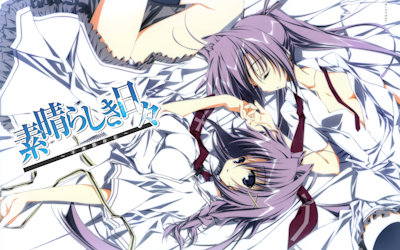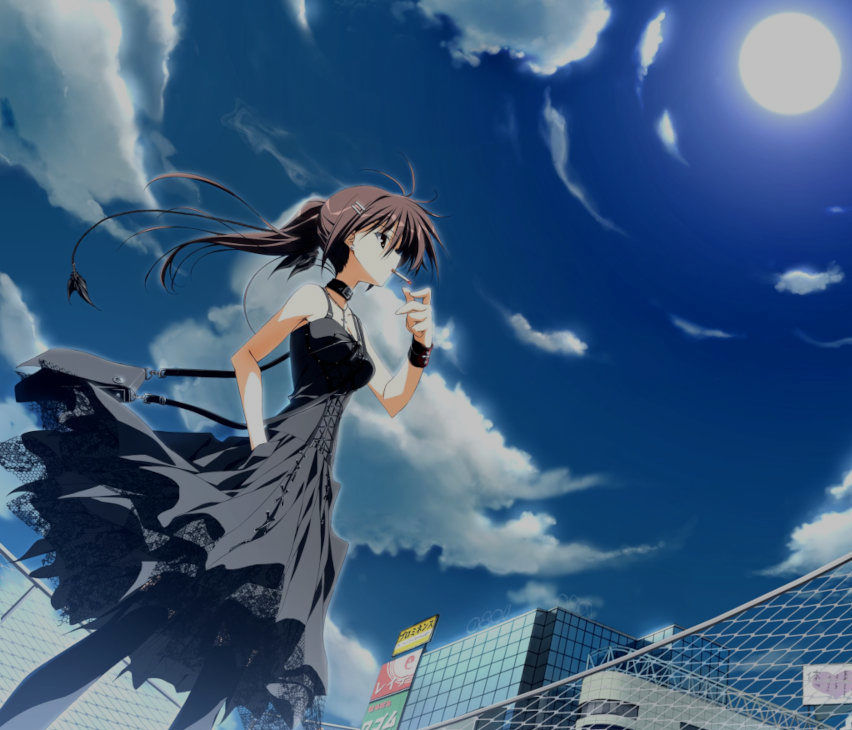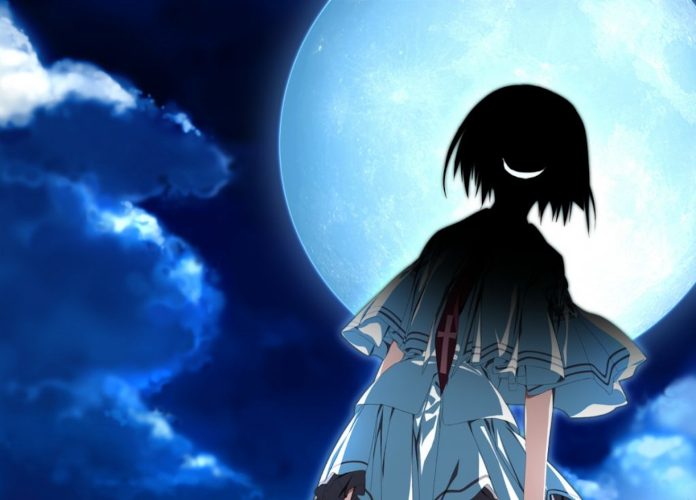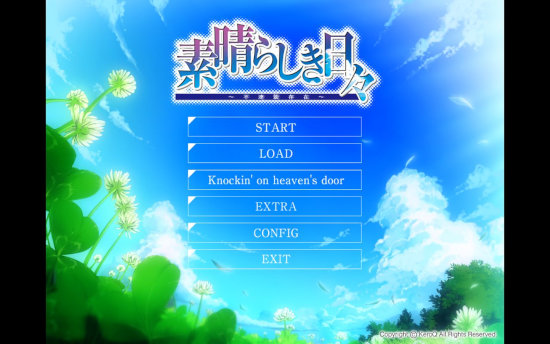SUBARASHIKI HIBI: TRACTATUSSY LOGICO-PHUCK
this review is free of major spoilers or triggering content! it was written with the intent of being read by people who are curious about the game and/or aren't able to play it because of its triggering content (which includes rape, incest, and murder).

ya know, when subahibi was recommended to me by my friend n0thanky0u (stream n0thanky0u), i said it was 100% off the table. i had a strong aversion to sex at the time, and the 50 hour runtime would be longer than any piece of media i'd ever touch. but i'm a sucker for a good soundtrack, and the osts that i heard were 10,000% up my alley. bittersweet piano pieces inspired by erik satie, a RIPPING j-rock op, AND weird fucked up dance music? fuminori matsumoto is an extraordinary composer whose work still fascinates me to no end. so i grabbed the torrent and it sat on my ssd, waiting, its eyes glaring from my desktop, my nerves keeping my mouse pointer from anything more than hovering over the shortcut.
the night i got the guts to boot it up, the art and music on the menu instantly evoked a visceral sadness in me. i could tell in that moment that i was about to begin something life-changing. i let the feeling wash over me for a few minutes before i pressed start. that opening scene is engraved into my brain: a pan outwards into a gorgeous drawing of our first protagonist, minikami yuki, on a rooftop with the dreamy blue sky behind her..and from the get-go, yuki's voice acting and writing is infectious. she will not stop being charming for the rest of the game. she's the best character- a girl who's even lovable in her flaws, but doesn't fall victim to the "mary sue" syndrome. she was a reminder of sca-ji's talents throughout my playthrough and my motivation to finish the game even when shit got rough. i'm getting a bit ahead of myself, though, cuz the following six hours of subahibi (a chapter titled "down the rabbit hole") were a very slow slice-of-life tone setter. personally, i love those six hours. they allowed me to develop a relationship to yuki and her "gaggle of lesbians" (zakuro, tsukasa, and kagami) free of any melodrama. but all good things must end, and shit hits the fan quickly.

down the rabbit hole ii is undoubtedly my favorite portion. its pacing is snappy as shit, wasting NONE of your time on h-scenes or maintaining the illusion of peace from dtrh i. you're fired on a rocket into the mystery of the game's central suicide immediately. in this chapter, yuki plays a similar role as special agent dale cooper in the first season of twin peaks: an outsider to a tragic situation who brings not only levity, but a passion for the investigation that both shows how deeply she cares for others' well-beings and rubs off on the player. it's her finest hour. this is also where subahibi begins to incorporate one of its strongest elements: abstract horror. wow, another twin peaks comparison! seriously, if you were craving more weirdo shit after the unique highs of this chapter, i cannot recommend twin peaks enough. it scratched the itch for me.
consider playing down the rabbit hole i and ii and leaving the game there if you're wary about its disgusting content, because they are self-contained and feature literally none of the infamous fetish content or sexual violence. there is also little to no gore in these chapters, and a skip button if you need it. in my case, the harrowing ending of this grabbed me by my collar and shook me. i was going to keep playing no matter what disturbing garbage sca-ji threw my way. i wanted to know what happened to yuki. i NEEDED to know what happened to yuki.
so the next chapter opens with a character who is not yuki, weeks before she enters the story.
it's my own invention eats up the majority of the game's runtime, yet it leaves you with more questions than answers about the catalyst suicide (which by this point has opened up into a conspiracy riddled with cult antics). i love a good cult story. that being said, i was livid when i realized that this chapter plants you in the shoes of the cult's leader. he is a stomach-churning psychopath in dtrh ii; he's no caricature, and he's no dunce. he is as mysterious as he is cunning. in a way, this makes IMOI pretty compelling storytelling. in another way, this makes for a revolting 20-hour nightmare fest, lived through the eyes of the man i hate most. sca-ji's character writing is top-notch (AS FAR AS THE MAIN CAST) and it's my own invention sees him using his talents for evil. in spite of that... this chapter is my second favorite. yes, i had to skip multiple hours of it because it's riddled with h-scenes that range from "greatly improving the story" to "thinly veiled fetish bait". it lacks focus. what surrounds these h-scenes, however, is some of the finest psychological warfare in any medium. the cult leader has all the mental stability of a coked-up rat, so seeing the world from his unstable perspective isn't nerve-wracking, its nerve-annihilating. i was constantly paranoid and questioning what was real. this is also the chapter where the world begins to feel more fleshed out. suginomiya cements itself as a tangible place, defined equally by its bright city streets and the shapeless dark mystery pouring between your fingers...
i gotta cut the play-by-play crap, though, and get real for a second. the second half of the subahibi fumbles the bag AND shits the bed. looking-glass insects, the fourth chapter, is captivating, tense, and shockingly mature, but it's the shortest chapter. it's like a detour after the massive whopper double combo of it's my own invention. the conclusion chapters (5, 6, and 7) are genuinely fucking abysmal and squander the mystery that made the previous 30ish hours interesting. so you may be asking: if the entire back half of the game sucks, and the whole thing is plagued by vile h-scenes, what makes subahibi worth it? why even bother writing this review? well stop pestering me, bitch, and maybe i'll explain!
while the most praised aspects of subarashiki hibi are its plot and philosophy, i can't say either of those stuck with me as much as the vivid fictional district of suginomiya. whether it be the alleyway the gals and i ran down time and time again to get to and from school, with the little hole-in-the-wall shop on the right - a cafe of some kind?- or the plaza, always bustling with people at mid-day, or the rooftop of school building c where yuki could be caught skipping class to read some old book or smoke, the atmosphere is simply unmatched. not to mention the bold duality in sca-ji's writing, which makes a place so visibly cozy feel like a hellscape as soon as the tone shifts. take the alleyway as an example. in chapter 4, the actual background art for the alleyway hasn't change. yet it feels more claustrophobic simply from knowing what is happening and will happen there and that those walls are too close together to escape if you're cornered. i've heard someone use the term "daylight horror" once before (someone being me i made it up), and i think this game embodies that perfectly. though suginomiya may be home, and people's day-to-days are still day-to-daying, our characters are facing terrors of the macro (existential) and micro (physical) in these places. it's that feeling when you're paranoid in public, surrounded by people who don't know anything is wrong while you know that something very much is. i'd kill for more games that capture that vibe. it's a difficult thing to pull off. hence why subahibi is so unique!

the daylight horrors are one example of such tone dichotomies in this game, and the more i think about it, the more i'm certain that sca-ji's central purpose with said dichotimies was to explain his interpretation of the tractatus logico-philosophicus. the last chapter bluntly beats you over the head with heavy-handed wittgensteinian monologues, though it's the indirect messaging that's more effective: whether it be the meta-but-also-not fakeout that is the first chapter, the jarring h-scenes, or takuji and kimika's heartfelt moments in the midst of brutal depravity. sca-ji screams in the face of the finite limits of the world and the dire state of all things, "we must live happily". the bits about abstract fears vs concrete realities played off of the abstract horror scenes nicely. i can't say that it resonated with me on a deep level, but i was impressed by how concisely sca-ji was able to communicate some complicated viewpoints when he wasn't beating me over the head.
there's a secondary purpose to this story too, one i'd argue is a bit more interesting (if by virtue of being less discussed). it was brought to my attention by otonashi ayana, the elusive girl whose presence is never quite explained. i think she might be a stand-in for sca-ji himself. in fact, the whole game might be about sca-ji. subahibi is raw, unedited, and chock full of dream-logic hysteria. it is a sprawling 50 hour epic with a somewhat non-linear plot where things HAPPEN in ways that tend to make more thematic than logical sense. and it slowly starts to peel back and reveal a picture of the man at the center of at all. don't worry- i'm not about to go all beginner's guide and start psycho-analyzing him. however, i'll say that if any part of this game was edited out, it would be a detriment to sca-ji's writing (though i'd rather there was a bit more tact as far as the framing of rape scenes). i left subahibi's world with a lot of thoughts in my brain and an unusual sense of intimacy. there's always some part of yourself you have to hold back to make yourself and your vision stomachable to others. subahibi is what happens when you don't. subahibi is what house of leaves is to mark danielewski, or the unedited version of dorian gray to oscar wilde. it's the full realization of the intensely overambitious and honest dream project many a young artist has.
so as far as like, the actual script and story and all that, that's what makes subahibi "worth it". but you may have noticed, there's one aspect i've mentioned but not detailed, and it's probably my favorite thing about the game.
that.
damn.
soundtrack.
this is my recommendation for anyone who reads this review. i can't in good faith recommend playing subahibi past down the rabbit hole ii, but i CAN force you to listen to the bgm and the opening and ending tracks. fuminori matsumoto and pixelbee's compositions bleed earnest teenage melodrama to the point where i don't need to understand the lyrics to know what these songs are about. it's blue skies and freeway drives. it's wind blowing through your hair as you look down at the city below. it's nights where you lie alone in your bed, remembering the sounds and sights of summers past and dying to relive everything one more time, good or bad. truly the perfect soundtrack for a game about learning to live through trauma. whether or not subahibi handles its subject matter well, whether its poorly paced, and whether it was a good idea to expose my brain to this pandora's box of fetish filth ceases to matter when the chords of the title theme begin to play and i get a little misty-eyed and think, damn, what a world, what a piece of art. also, one of my favorite musicians (and a vocaloid icon), ryo from supercell, made some of the bgm. that's super cool!

the closest thing subahibi has to a true ending (ignoring its dubiously canon epilogue) isn't an ending at all. instead, after one last conversation with ayana, you are sent back to the beginning of down the rabbit hole i. the only concrete answers are contained within the two straightforward and honestly terrible side endings. and excuse me if this is too charitable a read, but... i feel like that might be on purpose. why are you searching for endings and answers? what would a storybook closer change about what happened to the characters? nothing, bitch. and so it begins again.
END GAME REVIEW